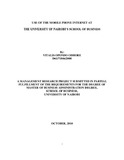| dc.description.abstract | The mobile phone has become a crucial tool the world over - be it for communication, entertainment, text messaging, money transfer, or as a recorder, radio, television, calendar, diary, clock, camera, games platform and mathematical converter. It is, without question, a key player in virtually all social and business transactions in our daily lives. Lately, a great variety of mobile phones with internet capability have emerged in the market. This is a positive trend as it is ideally supposed to expand internet accessibility to the lowest end of the society. On the contrary however, this technology on mobile phones is for a number of reasons yet to be harnessed to the maximum.
The general objective of this research was to investigate the use of the mobile phone for accessing the internet at the University of Nairobi. The research was carried out through survey method, with a questionnaire being the avenue for collecting data. The study established that Nokia phones are by far the most popular among users at the School of Business, while Safaricom as a service provider enjoys the highest subscription. Further, even as the study established that preference for phones with internet capability was high within the university, it was found that it is the younger generation (especially age 21-25) that exploited mobile phone internet, especially for emails and social network sites.
In addition this very active age-group mostly used mobile phone internet for e-mail and social networking - while avoiding other internet features as weather and stock market news. The study also found that the older generation (51 and above) generally stayed away from mobile phone internet. In addition, size and lightness of the mobile phone was greatly endorsed as a benefit of using the handset for internet access, while phone memory, downloading problems due to internet compatibility with mobile phones were seen as key challenges of using the gadget for internet access. The study recommends that more sensitisation be carried out among mobile phone users to promote the use of the handset for internet access. The research additionally recommends that that the government finds ways and means of making internet-enabled phones more accessible and cheaper, to further enhance internet access among the country's population and thus help to spur economic development. | en_US |

